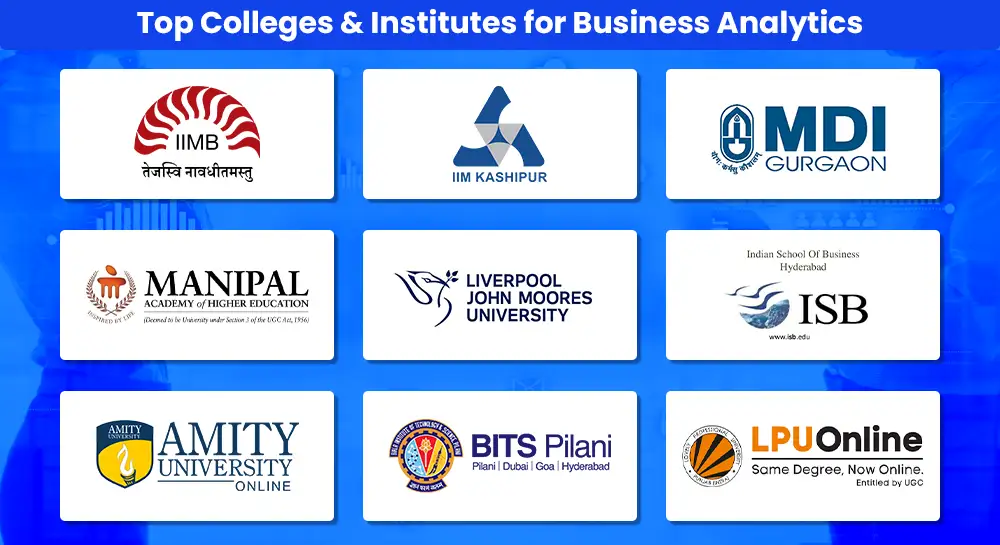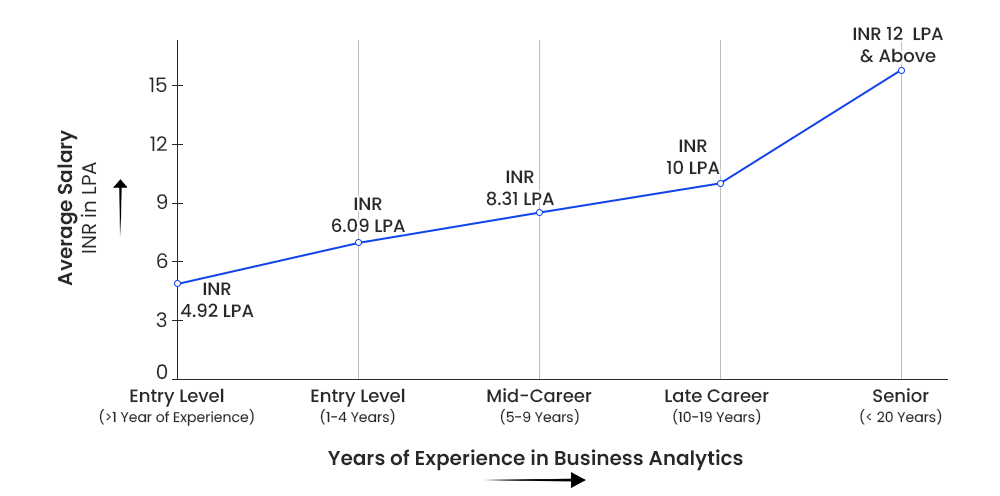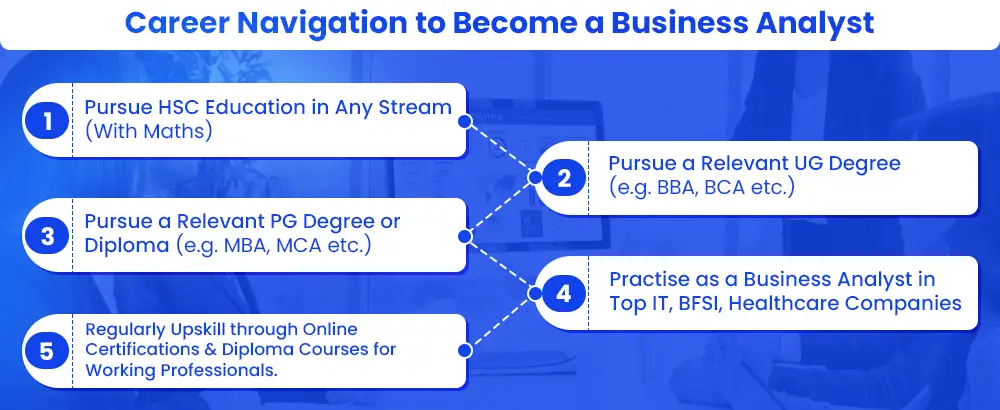Expert Interviews
- University Reviews
- Career Guide
 Video Counseling
Video CounselingImportant Facts
- Ask any Question - CV Forum

How To Become a Business Analyst In 2026: A Complete Career Guide
College Vidya Team Jan 23, 2026 1.2K Reads

Arising from the integration of data analytical techniques with business intelligence, business analytics is a unique and highly demanded career domain that helps organizations make important decisions to drive growth and development based on data insights. Business analytics as a career domain is perfect for individuals who aspire to analyze big data as well as contribute to business transformation.
In addition to being well-suited for analytically oriented professionals, it also offers the scope of making a stable future owing to its growing demand and appealing compensation. It is being heavily adopted by industries such as BFSI, healthcare, investment banking etc (mordorintelligence).
The field of business analytics is significantly agile and fast-paced and offers the professional or business analytics student to explore different areas such as descriptive analytics (focusing on the “what” of business trends), diagnostic analytics (understanding the “why” of particular trends and business data patterns), predictive analytics (forecasting future performance/trends based on current analysis) and predictive analytics (focusing on the future course of action by business in order to thrive in a given business environment).
Why Choose a Career in Business Analytics?
Business analytics is a raging career option preferred by students and professionals from technical and non-technical backgrounds alike. But before jumping onto the bandwagon of opting for a career in this field, it is important to understand what makes the field so lucrative and popular. Here are 5 reasons to consider taking up a career in business analytics.
- Growing Demand of the Industry: Within a decade from now, i.e. by nearly 2032, this field is forecasted to grow by a whopping 12.7%, touching nearly $180.5 billion. Scuh statistics point to the expected growth that the field is likely to witness, making for a stable and prosperous career option in the near future.
- Lucrative Compensation in Business Analytics: The demand for qualified professionals trained in business analytics being high, the compensation and perks offered to such professionals is also quite high. A business analyst can start earning anywhere between INR 4 LPA to INR 5 LPA as a fresher, with the pay packages hiking upto INR15 LPA with experience.
- Spearheading Digital Transformation: Business analysts also have a primary role to play when businesses are undergoing digital transformation, which is gradually becoming a need of the hour for profit-driven ventures. Hence, business analysts get the opportunity to not only benefit from a stable and lucrative career, but also become a key stakeholder in reducing costs, optimising processes and leading innovation for organisations.
- Diverse Career Options: Lastly, the field of business analytics offers diverse options for career exploration, as it is closely linked with the fields of data analytics, business intelligence, data science, statistics and so on. This allows an interested person in exploring a myriad of lucrative and dynamic job options related to business analytics.
Roles & Responsibilities of a Business Analyst
When it comes to the job responsibilities and nature of the field of business analytics, a professional must focus on multiple aspects ranging from core data analytics and solutioning to stakeholder management, communication and change management:
- Data Gathering & Requirement Analysis: Gathering data about the major business and client requirement and further analysing the same to create “business requirement documents” or BRDs.
- Data Analysis & Reporting: Processing gathered data and conducting further descriptive, diagnostic, predictive and prescriptive analytics techniques to derive meaningful insights and guide business decisions.
- Stakeholder Management: In addition to conducting analytical procedures, a business analyst also plays the significant role of communicating the findings to key stakeholders within and outside the organisation to enhance their understanding.
- Improving Business Processes: An important job responsibility of a business analyst from an operations perspective includes analysing the business processes in an organisation and further propose changes to them.
- Change Management: Closely associated with business process improvement, since business analysts often direct changes in such internal processes, they also facilitate change management with respect to supervising the attainment of deliverables, visualising data findings for the change, developing and tracking performance metrics of employees and so on.
- Project Management Support: Lastly, business analysts are often closely working in various projects as consultants and may often need to perform some duties of project management such as using analytics to predict risks, develop and track deliverables and so on.
Thus, as can be seen, business analysts play a prime role in the development of business strategies based on analytical findings.
Key Skills Needed for Business Analytics
Business analytics as a field requires proficiency in key softwares, techniques for data visualisation, reporting etc. alongside a host of soft skills which enable seamless job progress and success. These skill areas have been elaborated below.
1. Technical Skills & Knowledge to Succeed as a Business Analyst
There are certain clustered domains of technical skills which are important for establishing a career in business analytics including the likes of software and programming skills, proficiency in data modeling, forecasting and visualisation. The details for the same have been provided below.
|
Key Skills |
Specifications |
|
Programming Skills |
Working knowledge of programs such as Java, Python, R, SAS etc. are important for business analysts |
|
Software Development |
Business analysts need to know about the basics of software development using frameworks and methodologies such as Agile, Scrum, XP etc. |
|
Statistical Softwares |
Knowledge of statistical softwares is crucial for effective and advanced analysis of data. Common softwares include R, SPSS etc. |
|
Visual Modeling |
Visual and predictive modelling are skills that enable the business analyst to represent the data insights they gain in the form of comprehensive models which communicate findings to clients and stakeholders. Common tools for this include Power BI, MS Powerpoint, MS Excel etc. |
|
Data Analysis & SQL |
Data analysis in itself is at the heart of business analytics, and hence business analysts must have proficiency in data analysis using softwares like Excel, SQL etc. |
|
Excel & Spreadsheet Analysis |
In addition to data analysis skills, business analysts must also have a good grasp of working with spreadsheets and using them for data visualisation, data analysis, basic processing and so on. Common softwares include MS Excel, Google Sheets and so on. |
2. Soft Skills to Succeed as a Business Analyst
In order to thrive in the field of business analytics, certain soft skills are important for managing the key job responsibilities such as stakeholder management, team coordination, data analysis and so on. Proficiency in quick and effective problem solving paired with an aptitude for critical reasoning is helpful for a business analyst to thrive in their career. Further details of the same are provided below.
|
Key Skills |
Specifications |
|
Critical Thinking |
The aptitude of critical thinking helps business analysts to identify challenges, current contexts of business environments, available options and come up with the most effective solutions. |
|
Problem-Solving Skills |
Problem solving is at the heart of the profession of business analysis. Having a solution-oriented mindset and ability to identify potent and innovative solutions helps business analysts to overcome challenges identified through analytics. |
|
Communication & Persuasion Skills |
Communicating the insights and findings from available business data to stakeholders is central to transform the business as well as address the challenges being faced. Persuasion skills become central in this aspect for stakeholder management. |
|
Attention to Detail |
Identifying data patterns, anomalies in data, processing data, eliminating outliers etc. are all aspects of business analytics that command an attention to detail in the professional. |
|
Adaptability |
Staying up to date with the latest developments of the field, including new technologies, new softwares, industry trends and so on is essential for business analysts to ace their career journey. |
|
Teamwork & Collaboration |
With the frequently cross functional teams that business analysts work with, possessing skills of teamwork, collaboration and interpersonal competence are essential to create a positive impact. |
What are the Career Opportunities for Business Analytics (Types of Options available in Business Analytics)
The career of business analytics is closely associated with fields like data analysis, data science, research and analysis, consultation, business intelligence etc. These fields all place a central emphasis on utilisation of data for organisational growth. The common aspects such as data analysis, statistical analysis, data modeling, forecasting, reporting and data visualisation enable a business analyst to explore the below mentioned related careers.
Not only are these careers well-paid and lucrative, but they offer a significant potential for growth owing to the boom in data-centric decisions companies are making in recent times.
|
Career Option |
Description |
Average Salary (Per Annum) |
|
Data Analyst |
A professional using data processing, cleaning and analysis to derive insights to guide organisational decisions. |
INR 6.7 LPA |
|
Business Analyst |
A professional who utilises data-driven findings to guide organisational business decisions. |
INR 8 LPA |
|
Market Research Analyst |
A professional focusing on deriving business and market insights for further guiding marketing and organisational decisions. |
INR 7 LPA |
|
Financial Analyst |
A professional utilising data analytics to derive insights about financial performance of the company, financial trends and predict future financial performance. |
INR 6.26 LPA |
|
Data Scientist |
A professional utilising data analytics at an advanced level alongside programming and predictive analytics to drive informed business decisions. |
INR 14.5 LPA |
|
Business Intelligence (BI) Analyst |
A professional utilising data visualisation techniques for presenting key data insights and guide organisational decisions accordingly. |
INR 7.39 LPA |
|
Operations Analyst |
A professional focusing specifically on data analytical techniques to improve operational functions in the organisation including workflows, cost reduction etc. |
INR 5.5 LPA |
|
Supply Chain Analyst |
A professional focusing specifically on data analytics to guide and improve the supply chain operations of organisations including costs, logistics, procurement, inventory etc. |
INR 6.74 LPA |
|
Product Analyst |
A professional utilising data analytics to address customer needs, feedback, queries etc. and improve a product accordingly. |
INR 11 LPA |
Career Analysis: What is the Salary & Demand for Business Analytics?
To understand the feasibility of taking up a career in business analytics for yourself, you must consider certain key factors such as the current (and predicted industry trends for the field), the investments required to establish oneself as a business analyst as well as the stipulated trajectory of growth for the field. The same has been elaborated upon below.
1. Demand for Business Analysts : Industry Trends
Some of the key industry trends in the field of business analytics include:
- The business analytics industry is forecasted to register a compound annual growth rate (CAGR) of 8/07% between 2024-2029 as per reports by Mordor Intelligence.
- The fastest growing market in business analytics has been found to be in the Asia-Pacific region.
- Business intelligence or BI alongside data visualization are emerging as two of the key areas where companies and big players are laying emphasis.
- The Banking, Financial Services and Insurance industry or BFSI sector has been found to be one of the largest shareholders of the business analytics industry.
- Some of the market leaders in this field include Oracle Corporation, IBM, SAP SE, Microsoft Corporation, Tibco Software and so on.
2. Fees & Cost Involved in Becoming a Business Analyst
Business Analytics as a career domain requires certain investments in terms of time, formal education and financial investment before a person can practise as a professional. The nuances of the field require the professional to hold preferably a degree or a diploma in business or data analytics.

Overall, unlike a few fields wherein one can upskill by self directed learning based on free learning materials, business analytics requires formal education in the field. For this, there are a number of courses available as degrees, diplomas and certifications that an interested student can pursue. Their fee range, while in a slightly higher bracket than other subjects, offers excellent return on investment (RoI).
A few of these courses along with their fee details are mentioned below.
|
Business Analytics Courses |
Approximate Course Fees |
|
INR 2,50,000 |
|
|
INR 2,50,000 |
|
|
INR 3,00,000 |
|
|
INR 2,50,000 |
|
|
INR 2,00,000 |
|
|
INR 1,50,000 |
|
|
INR 1,75,000 |
|
|
INR 2,75,000 |
|
|
INR 2,50,000 |
|
|
INR 2,00,000 |
|
|
INR 2,50,000 |
|
|
INR 5,50,000 |
|
|
INR 1,60,000 |
|
|
INR 5,00,000 |
|
|
INR 1,60,000 |
|
|
INR 2,00,000 |
|
|
INR 1,50,000 |
|
|
INR 1,08,000 |
|
|
INR 2,80,000 |
|
|
INR 2,00,000 |
|
|
INR 2,50,000 |
|
|
INR 5,50,000 |
|
|
INR 75,000 |
|
|
INR 10,00,000 (Stipulated) |
|
|
INR 10,00,000 (Stipulated) |
|
|
INR 12,20,000 |
3. Career Growth Trajectory of Business Analytics
Given the boom expected soon in this career domain paired with its high demand for qualified professionals in recent years, it is understandable that the compensation offered to business analysts are quite lucrative right off after completing formal education in the field.
While a fresher in this career can earn anywhere between INR 4 LPA to INR 5 LPA, over a period of maturation in the career, i.e. within 10 years in the field, a person can experience a growth of nearly 68.9%. Similarly, this statistic can hike upto 143.9% over a period of 20 years in the field, signifying immense potential for career escalation and growth.
The trajectory that one can expect their career to follow in this field has been represented graphically below.

Source: PayScale
Career Navigator: What Course to Pursue for a Career in Business Analytics?
To become a business analyst, a student needs to have a perspective about their career goals and accordingly evaluate the time and financial investments they can afford to make into training themselves in the direction. The overall navigation around becoming a business analyst includes:

Conclusion
Hence, it is clear that business analytics is a futuristic career domain with a myriad of opportunities for the professional to explore. Its rapid integration across industries further reflects an expanding scope which an aspirant can leverage to kickstart their career and grow on their professional journey.
FAQs (Frequently Asked Questions)
If you aspire into the career domain of business analytics after class 12th, then you can take up a relevant Bachelor’s degree like a BBA or a BCA with a specialisation in business analytics. Alternatively, you can also pursue any Bachelor’s degree and then pursue a postgraduate degree or diploma in business analytics. Examples include an MBA, a PG diploma or certificate in business analytics etc.
If you have a humanities background, you can still pursue a career in business analytics, provided you have at least higher secondary education in mathematics or statistics, i.e. you must have studied mathematics and/or statistics as a subject in grade 12 (or equivalent) to be eligible to take up a business analytics course. However, while this is a major requirement for many institutions, some institutions may offer this course without a mathematics background as well–students may be required to take up a bridging course in this case.
On average, current statistics indicate that a business analyst can earn anywhere between INR 6 to INR 7 LPA when they possess about 1 to 4 years of experience. Freshers can start anywhere near INR 5 LPA to INR 6 LPA and compensation can hike up to INR 12 and above.
Yes, when you pursue a UG or PG degree/diploma/certification from a UGC-DEB approved institute or college, then your online education in business analytics will be considered valid as well as equally recognised as a regular degree.
Some of the UG degrees to pursue to become a business analyst include a BBA, a BCA etc. with a specialisation in business analytics, a B.Sc in Mathematics, a B.Sc in Statistics, or PG degrees like an MBA in business analytics. PG diplomas and certifications are also valid qualifications to become a business analyst in India.

Idea Alchemist / Concept Creator / Insight Generator
We are an online education platform where users can compare 100+ online universities on 30+ X-factors in just 2 minutes. With an active CV community, we have transformed online learning to quite an extent. With the CV Subsidy scheme, we contributing to GER in India while helping our learners with their finances in their “Chuno Apna Sahi” journey!
Every query is essential.
Our team of experts, or experienced individuals, will answer it within 24 hours.
Recommended for you
Tired of dealing with call centers!
Get a professional advisor for Career!
LIFETIME FREE
Rs.1499(Exclusive offer for today)

Pooja
MBA 7 yrs exp

Sarthak
M.Com 4 yrs exp

Kapil Gupta
MCA 5 yrs exp
or



Career Finder
(Career Suitability Test)
Explore and Find out your Most Suitable Career Path. Get Started with our Career Finder Tool Now!
ROI Calculator
Find out the expected salary, costs, and ROI of your chosen online university with our free calculator.

